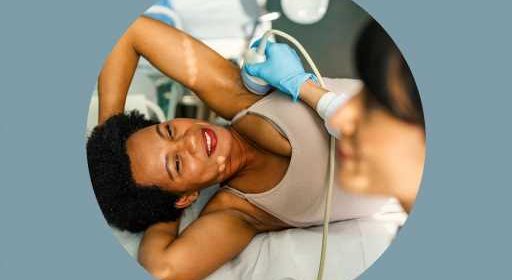Experts Have Changed the Age Black Women Should Get Breast Cancer Screenings For a Significant Reason

Black cisgender women might need to be screened for breast cancer earlier than non-Black cis women, according to an illuminating new study.
An international team of researchers investigated this topic in a recent report published in JAMA Open Network. Their discussion revolved around the staggeringly high breast cancer mortality rates for Black women in America. Although this demographic group is less likely to develop breast cancer than white women, they are 40 percent more likely to die from the disease.
This phenomenon has been chalked up to multiple factors, including a lack of access to breast cancer information and screenings.

The U.S. Preventive Services Task Force, which issues screening guidelines for doctors, currently recommends that women at average risk for breast cancer start getting mammograms every other year at age 50. However, the authors of the JAMA study said clinical trials might be worthwhile to explore whether that recommendation should be bumped down to 42 for Black women.
Researchers pinpointed this age by analyzing data on the 415,000-plus American women who died of breast cancer between 2011 and 2020. When looking at cases by race, ethnicity, and age, they found that Black women in their 40s were significantly more likely to die of breast cancer than white women in the same age bracket.
“[U.S.] health policy-makers may consider the alternative, risk-adapted approach in which individuals, such as Black females, who are at high risk are screened earlier,” the study’s authors wrote.
Sadly, these racial disparities in breast cancer-related deaths aren’t new news. It’s just one example of how America’s inequity-ridden, cost-prohibitive healthcare infrastructure prevents women of color from accessing potentially life-saving services.
In the context of breast cancer — the second most common cancer among cisgender women in the U.S., per the Centers for Disease Control and Prevention (CDC) — screenings are especially vital. Early detection usually equals a better prognosis, so if we want to prevent breast cancer-related deaths in Black women, broadening the criteria for screenings makes sense.
“This may be an important step toward a more optimized, equitable, and personalized breast cancer screening and may help mitigate the current long-standing disparity of early-onset breast cancer mortality in populations, especially Black females, at increased risk,” the study’s authors concluded.
But introducing policies to alleviate the high costs of cancer screenings might be necessary, too. One alarming study from 2022 found that women who had an abnormal mammogram were more likely to skip follow-up care if it involved a costly deductible.
Last fall, the Food and Drug Administration (FDA) unveiled new mammogram guidelines for women with dense breasts, who are more likely to develop breast cancer. Providers are now obligated to educate patients on breast density and offer additional screening measures, such as breast ultrasounds. If official recommendations can change to factor in breast density, who’s to say they can’t also incorporate race-related risk?
Before you go, check out these products that breast cancer patients and survivors will actually use:

Source: Read Full Article
